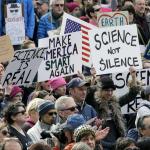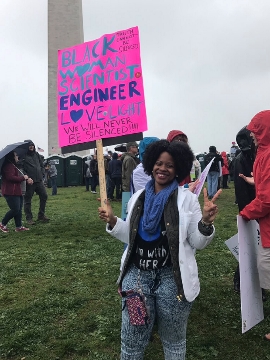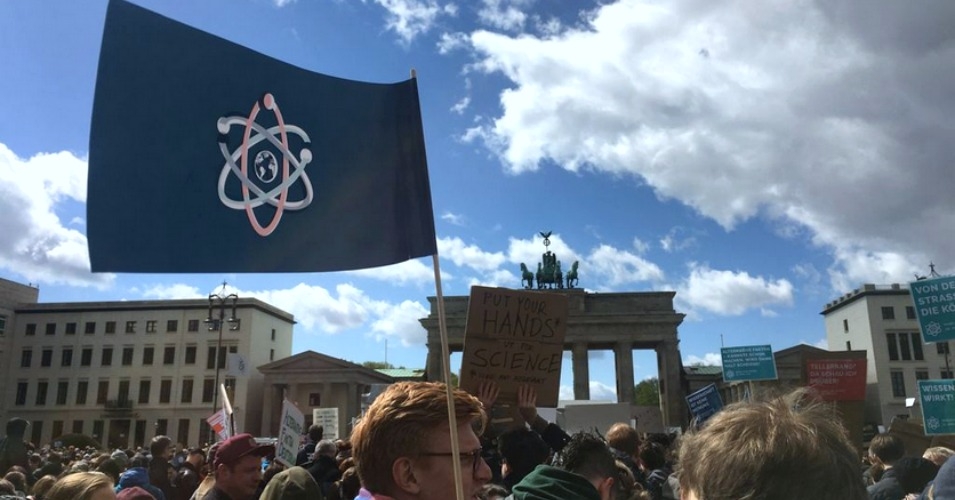Why Scientists Are Marching on Washington and More Than 400 Other Cities; March for Science & Peoples Climate March are Inherently Connected
https://portside.org/2017-04-22/why-scientists-are-marching-washington-and-more-400-other-cities-march-science-peoples

Portside Date:
Author: Joel Achenbach, Ben Guarino, Sarah Kaplan; 350.org
Date of source:
Chicago Tribune

- Why Scientists Are Marching on Washington and More Than 400 Other Cities - Joel Achenbach, Ben Guarino, Sarah Kaplan (Chicago Tribune)
- March for Science & Peoples Climate March are Inherently Connected - 350.org (Common Dreams)
By Joel Achenbach, Ben Guarino, Sarah Kaplan
April 21, 2017
The March for Science is not a partisan event. But it's political. That's the recurring message of the organizers, who insist that this is a line the scientific community and its supporters will be able to walk. It may prove too delicate a distinction, though, when people show up in droves on Saturday with their signs and their passions.
"We've been asked not to make personal attacks or partisan attacks," said honorary national co-chair Lydia Villa-Komaroff, in a teleconference this week with reporters. But Villa-Komaroff, who will be among those given two-minute speaking slots, quickly added: "This is a group of people who don't take well being told what to do."
The Science March, held on Earth Day, is expected to draw tens of thousands of people to the Mall, and satellite marches have been planned in more than 400 cities on six continents. The crowd will gather on Saturday near the Washington Monument for five hours of speeches and teach-ins, culminating in the march at 2 p.m. The march will follow Constitution Avenue along the north edge of the Mall to the foot of Capitol Hill.
Protest marches may be common in Washington these days, but one centered on the value of science is unprecedented. The march is part of a wave of activism in the scientific community. Scientists are jumping into the political fray by running for public office - such as in southern California, where geologist Jess Phoenix, a Democrat, has announced her candidacy for a congressional seat held by a Republican.
Many mainstream science organizations - such as the American Association for the Advancement of Science, the American Geophysical Union, and the American Chemical Society - have signed on, despite their lack of experience in going to the barricades.
Rush Holt, head of AAAS, said there was initial hesitation about whether this was the kind of event a scientist ought to be joining but that members of his association overwhelmingly support the decision to participate.
This is not simply a reaction to President Donald Trump's election, Holt said. Scientists have been worried for years that "evidence has been crowded out by ideology and opinion in public debate and policymaking." Long before Trump's election, people in the scientific and academic community raised concerns about the erosion of the value of expertise and the rise of pseudoscientific and anti-scientific notions. Science also found itself swept up into cultural and political battles; views on climate science, for example, increasingly reflect political ideology.
Mona Hanna-Attisha, the Michigan pediatrician who sounded the alarm on lead in Flint's drinking water, is one of the march's honorary co-chairs. Her experience as a physician in Flint paved the way for her science advocacy, Hanna-Attisha told The Post. "Pediatricians care for a population that can't speak, can't vote," she said, noting that doctors take an oath to protect patients from harm. "It is your role to be an advocate."
The line up for the event on the Mall includes some of science's biggest names. Bill Nye, CEO of the Planetary Society and another honorary co-chair, will speak, as will climate scientist Michael Mann and NASA Astronaut Leland Melvin. The musician Questlove is slated to give a performance.
Notably, astrophysicist Neil deGrasse Tyson, the most well-known living American scientist, will not be attending a science march, according to a representative. Tyson did not respond to a request to comment on why.
No politicians have been invited to participate in the march, organizers say, even as they acknowledge that this was inspired by the Women's March on the day after Trump's inauguration.
"Science is nonpartisan. That's the reason that we respect it, because it aims to reduce bias. That's why we have the scientific method. We felt very strongly that having politicians involved would skew that in some way," Caroline Weinberg, a public health researcher and co-organizer of the march, said at the National Press Club earlier this month.
Carol Greider, a Johns Hopkins molecular biologist and Nobel laureate, said in the conference call this week that she will bring dozens of students and postdoctoral researchers to the march. "People are actually questioning whether they can even go on and have a career in science," she said, noting the Trump administration's proposal to cut nearly a fifth of the National Institutes of Health budget. "Potentially, we will lose an entire generation of people who are now trained and have the talent and are eager to make the next breakthroughs."
Greider said it's possible to fight for science without "labeling ourselves" as being on one partisan side or the other. That was echoed by Elias Zerhouni, former NIH head under President George W. Bush: "This is not a partisan issue. This is not one administration versus another. . . . It's really an age-old debate between rational approaches to the universe and irrational approaches to the universe."
Not every scientist is convinced. Arthur Lambert, a cancer researcher at the Whitehead Institute at MIT in Boston, said he was initially excited about the science march. But as the event drew closer, it seemed increasingly unlikely that it would appear to be anything but partisan.
"It's a bad idea to align all of science against any political administration," Lambert said. "I don't think that's their goal . . . But it runs that risk, especially after such a heated election."
Recent political developments in Washington are among the primary drivers of this march. Before he became president, Trump promoted anti-scientific theories. He tweeted in 2012, "The concept of global warming was created by and for the Chinese in order to make U.S. manufacturing noncompetitive." He echoed the fully discredited notion that there is a link between vaccines and autism. During the presidential transition he reportedly discussed with vaccine skeptic Robert F. Kennedy Jr. the possibility of creating a vaccine safety commission.
To run the Environmental Protection Agency, he appointed Scott Pruitt, who as Oklahoma attorney general had sued the agency many times and who, during an interview in March, said he did not believe that human activity is a primary driver of the observed climate change - a statement at odds with scientific research.
The entry ban pushed in the early days of the administration, and associated rhetoric about building walls and restricting immigration, alarmed many leaders of science-related institutions that rely on the expertise of foreign nationals (at MIT, for example, 40 percent of the faculty was born outside the United States, according to the university's president).
The administration has not taken some actions initially feared by the scientific community. One fear was that climate data would be deleted or sabotaged; that hasn't happened. The EPA's website continues to describe climate change as largely driven by human activities.
Trump has yet to appoint anyone to several key science-related posts. He has not picked a White House science adviser. He hasn't nominated anyone to run NASA or the National Oceanic and Atmospheric Administration or the U.S. Geological Survey. He has let Francis Collins stay on an interim basis as head of the NIH, though it's not clear that Collins will be permanently retained. Public health positions are unoccupied that are crucial for responding to a global pandemic, a disaster every president since Ronald Reagan has faced.
Behind the scenes at the March for Science, there has been internal controversy about inclusiveness and diversity, and whether social justice should be central to the march's messaging. On social media, a number of scientists have said they are skipping the march because they think the organizers haven't focused enough on racism, sexism, and the scientific community's centuries-long history of marginalizing women and people of color.
Meanwhile, conservatives have derided the march as a political enterprise in which what's being advocated is not science, exactly, but left-leaning policies, such as the Obama administration's environmental regulations designed to curb carbon emissions.
But for most of those who will come to Washington or other cities on Saturday, the march is a chance to show solidarity, enjoy witty protest signs, and stick up for evidence and reason.
And not all of them will be scientists. Dennis Moore, a patrol cop at the Cherry Hill, N.J. Police Department, said he's marching to make the point that science benefits everyone.
"I've always been kind of a nerd," he said, mentioning that he was wearing a flux capacitor t-shirt as he spoke. "Science is our best tool for understanding the world around us . . . but I think we're basically just de-emphasizing science in our lives and in our communities."
Moore lives in New Jersey, but he and his wife will be visiting Boston on Saturday on a trip to celebrate their anniversary, and Moore plans to stop by the local science march while they're there.
How does his wife feel about that?

photo credit - Environmental engineeringPh.D. candidate, making the world better through renewable energy.
Common Dreams
“The Science March is about respecting science, the Peoples Climate March is about acting on it”

Lindsay Meiman, lindsay@350.org
This Saturday’s March for Science is inherently connected to the April 29th Peoples Climate March, climate scientists and environmentalists say: one march is about listening to science, the other is about acting on it.
The March for Science, taking place on Earth Day, will march in defense of truth and scientific fact. A week later, these values will manifest at the Peoples Climate March where movements for climate, jobs and justice will put forward a vision to build bold solutions that tackle climate change, create and retain fair jobs, and bring forth justice truly for all.
“The Science March is about respecting science, the Peoples Climate March is about acting on it,” said Ploy Achakulwisut, PhD Candidate in Atmospheric Science at Harvard University. “Science has helped us understand the climate crisis, now we need to demand political action to help solve it. The March for Science calls for science-based policymaking, and the Peoples Climate March puts this value into practice by opposing Trump's reckless anti-climate agenda, defending the integrity of climate science and democracy, and standing up for justice."
The March for Science and Peoples Climate March will bring the fight for truth and justice right to the doorstep of the Trump administration. The week of action, dubbed “From Truth to Justice: Earth Day to May Day 2017,” will see over 50 events, including: climate education opportunities and the launch of visionary legislation, youth speak-outs and convergences, direct actions, and more.
A series of climate education videos have been developed for use during the “Truth to Justice” week of action. The videos feature 350.org co-founder Bill McKibben, actor and activist Maggie Gyllenhaal, renowned climate scientist James Hansen, longtime head of the EPA Environmental Justice program Mustafa Ali, and top atmospheric scientist Katharine Hayhoe.
Many of the organizers and participants of the March for Science have backgrounds in climate science, and many have been advocating for bold climate action well before the election of Donald Trump.
"The March for Science and the Peoples Climate March go hand-in-hand," said MIT and Harvard renewable energy modeler Dr. Geoffrey Supran. "Because attacks on science don’t just hurt scientists, they hurt scientists’ ability to protect the people, and climate change epitomizes that. When politicians cater to fossil fuel interests by denying the basic realities of climate science and pursuing anti-science climate policy, they endanger the jobs, justice, and livelihoods of ordinary people everywhere. The Peoples Climate March is about scientists and citizens uniting to protect the people and places we love by demanding that evidence, not ideology, inform policy."
###
350 is the red line for human beings, the most important number on the planet. The most recent science tells us that unless we can reduce the amount of carbon dioxide in the atmosphere to 350 parts per million, we will cause huge and irreversible damage to the earth. But solutions exist. All around the world, a movement is building to take on the climate crisis, to get humanity out of the danger zone and below 350. This movement is massive, it is diverse, and it is visionary. We are activists, scholars, and scientists. We are leaders in our businesses, our churches, our governments, and our schools. We are clean energy advocates, forward-thinking politicians, and fearless revolutionaries. And we are united around the world, driven to make our planet livable for all who come after us.

Berlin, Germany
